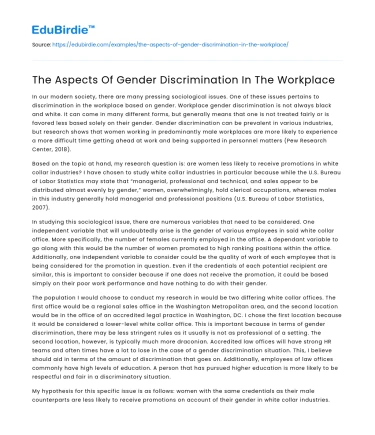In our modern society, there are many pressing sociological issues. One of these issues pertains to discrimination in the workplace based on gender. Workplace gender discrimination is not always black and white. It can come in many different forms, but generally means that one is not treated fairly or is favored less based solely on their gender. Gender discrimination can be prevalent in various industries, but research shows that women working in predominantly male workplaces are more likely to experience a more difficult time getting ahead at work and being supported in personnel matters (Pew Research Center, 2018).
Based on the topic at hand, my research question is: are women less likely to receive promotions in white collar industries? I have chosen to study white collar industries in particular because while the U.S. Bureau of Labor Statistics may state that “managerial, professional and technical, and sales appear to be distributed almost evenly by gender,” women, overwhelmingly, hold clerical occupations, whereas males in this industry generally hold managerial and professional positions (U.S. Bureau of Labor Statistics, 2007).
Save your time!
We can take care of your essay
- Proper editing and formatting
- Free revision, title page, and bibliography
- Flexible prices and money-back guarantee
In studying this sociological issue, there are numerous variables that need to be considered. One independent variable that will undoubtedly arise is the gender of various employees in said white collar office. More specifically, the number of females currently employed in the office. A dependant variable to go along with this would be the number of women promoted to high ranking positions within the office. Additionally, one independent variable to consider could be the quality of work of each employee that is being considered for the promotion in question. Even if the credentials of each potential recipient are similar, this is important to consider because if one does not receive the promotion, it could be based simply on their poor work performance and have nothing to do with their gender.
The population I would choose to conduct my research in would be two differing white collar offices. The first office would be a regional sales office in the Washington Metropolitan area, and the second location would be in the office of an accredited legal practice in Washington, DC. I chose the first location because it would be considered a lower-level white collar office. This is important because in terms of gender discrimination, there may be less stringent rules as it usually is not as professional of a setting. The second location, however, is typically much more draconian. Accredited law offices will have strong HR teams and often times have a lot to lose in the case of a gender discrimination situation. This, I believe should aid in terms of the amount of discrimination that goes on. Additionally, employees of law offices commonly have high levels of education. A person that has pursued higher education is more likely to be respectful and fair in a discriminatory situation.
My hypothesis for this specific issue is as follows: women with the same credentials as their male counterparts are less likely to receive promotions on account of their gender in white collar industries.
In order to test this hypothesis, I would use a detached observation method of data collection. I chose this method because it is important that the research has no effect on the subject at hand. Gender discrimination is indeed a crime, and if a person in power is aware that a study is being conducted, they may change their behavior to avoid getting in trouble. By using a detached observation method, we can see reality for women in white collar workplaces for how it truly is. Other methodological approaches would not do an effective job of keeping the study discrete and preserving the true nature of these white collar offices. The advantage of using a detached observation method in this circumstance is that it creates relevant, quantifiable data that is uninterrupted and genuine. With the supplement of a face-to-face interview, which is common with detached observation methods, I will be able to have both an objective and subjective view of the situation at hand. The disadvantage of this method is that observations cannot be generalized for an entire population of women in white collar workplaces, it can only be applied to the specific test population at hand. To carry out this research, I would contact the women at hand at the time that they are due for their promotion interviews, and have them discreetly record the conversation with their managers on their phones or an alternative recording device. According to the National Labor Relations Board, employees are allowed to record conversations at work without the permission of a supervisor as long as one party consents to it. In this case, the one party is the woman being interviewed. I would also get the resume/credentials of the male counterpart that is being considered for the promotion, and have a set of questions for the woman to ask her supervisor. In the case of her not receiving the promotion, she can ask these questions and his answers to these direct questions should help to see if she did not receive the promotion due to her gender. One additional variable that I must consider here is how to interpret the reasoning given for her not receiving the promotion as legitimate or not.






 Stuck on your essay?
Stuck on your essay?

